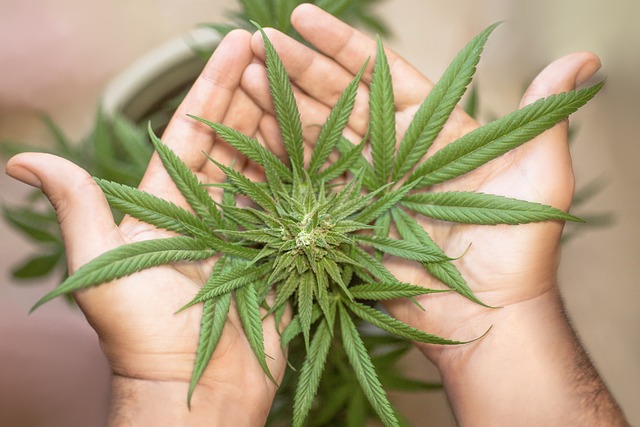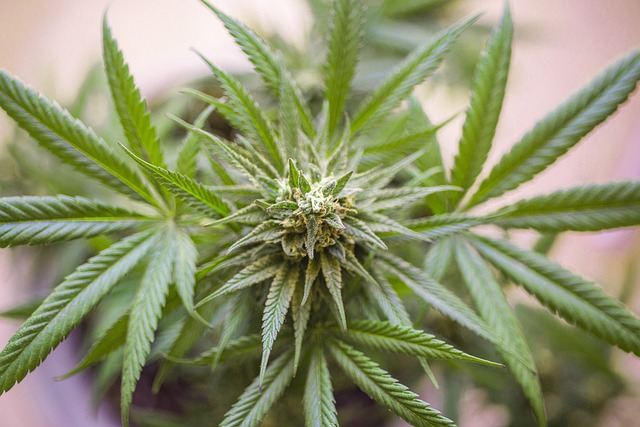New Hampshire has taken a significant step forward by legally recognizing THCA (Tetrahydrocannabinolic Acid) flower for its therapeutic benefits, distinguishing it from its psychoactive relative THC (Delta-9 Tetrahydrocannabinol). THCA is non-psychoactive and offers health advantages, particularly for those dealing with chronic pain and inflammation, without impairment. The state's regulatory framework ensures the safety and efficacy of these products, catering to individuals seeking natural health alternatives. Research indicates that THCA possesses anti-inflammatory, neuroprotective, analgesic, and potentially antibacterial properties, making it an attractive choice for those interested in cannabinoid therapy for various conditions, including epilepsy and gastrointestinal disorders. The distinct properties of THCA engage with the endocannabinoid system differently than other cannabinoids, highlighting its unique therapeutic potential. As New Hampshire continues to refine its regulatory approach, consumers are encouraged to stay informed on the evolving legal landscape surrounding THCA and to purchase products from licensed sources within the state to ensure compliance and safety while exploring this emerging wellness option.
Discover the emerging wellness frontier with THCA flower, a naturally occurring, non-psychoactive form of cannabis that’s legal in New Hampshire. Our comprehensive article delves into its therapeutic potential, detailing the unique cannabinoid profile of raw THCA and its health benefits. Explore how to safely harness these properties within the legal framework set by New Hampshire laws, including proper usage and dosage guidelines for optimal medicinal effects. Join us as we unravel the science behind THCA and its impact on health, providing valuable insights for those interested in this alternative remedy.
- Unveiling the Therapeutic Potential of THCA Flower: A Legal Option in New Hampshire
- Cannabinoid Profile and Health Benefits of Raw THCA: A Closer Look
- Maximizing the Medicinal Properties of THCA in a Legal Context: Usage, Dosage, and Precautions in New Hampshire
Unveiling the Therapeutic Potential of THCA Flower: A Legal Option in New Hampshire

New Hampshire has taken a significant step forward in embracing cannabis wellness by legally recognizing the therapeutic potential of THCA (Tetrahydrocannabinolic Acid) flower. Unlike its psychoactive counterpart THC (Delta-9 Tetrahydrocannabinol), THCA is non-psychoactive, offering a range of benefits without the ‘high’ associated with cannabis use. This makes it an accessible option for those seeking relief from various conditions, including chronic pain and inflammation, without impairment.
The THCA flower contains a wealth of beneficial compounds, including terpenes and flavonoids, which work synergistically to provide potential health benefits. Studies suggest that THCA may possess anti-inflammatory, neuroprotective, and analgesic properties, making it a compelling alternative for those who prefer cannabinoid therapy without psychoactive effects. In New Hampshire, where legislation has paved the way for legal use, residents now have the opportunity to explore this cannabinoid’s potential as part of their wellness routine, with an emphasis on products that adhere to state regulations ensuring safety and efficacy. This progressive stance on THCA flower benefits reflects a growing understanding of the complex cannabis plant and its components, offering hope for those seeking natural alternatives to traditional medications.
Cannabinoid Profile and Health Benefits of Raw THCA: A Closer Look

The cannabinoid profile of THCA, or tetrahydrocannabinolic acid, sets it apart from its decarboxylated form, THC, which is well-known for its psychoactive effects. THCA is the raw, non-psychoactive precursor to THC and is found in raw cannabis plants that are legal in states like New Hampshire under certain conditions. Unlike THC, THCA does not induce a high but has been the subject of growing interest due to its potential health benefits. Research suggests that THCA may offer anti-inflammatory, neuroprotective, and analgesic properties without the psychotropic effects associated with THC. Studies have indicated that THCA could be beneficial for individuals suffering from various conditions, including neurological disorders like epilepsy and multiple sclerosis, as well as offering potential gastrointestinal support. Additionally, it is believed to have antibacterial qualities and may contribute to overall immune health. The unique therapeutic properties of THCA are attributed to its interaction with the body’s endocannabinoid system, where it binds to both CB1 and CB2 receptors, offering a different profile of effects compared to many other cannabinoids. As interest in the health benefits of raw cannabis continues to grow, New Hampshire’s legal landscape offers an opportunity for residents to explore the potential advantages of incorporating THCA-rich cannabis into their wellness regimen.
Maximizing the Medicinal Properties of THCA in a Legal Context: Usage, Dosage, and Precautions in New Hampshire

In New Hampshire, where the legal landscape for cannabis and its derivatives continues to evolve, understanding how to maximize the medicinal properties of THCA (Tetrahydrocannabinolic Acid) is paramount for individuals seeking its potential benefits. THCA is the non-psychoactive precursor to THC (Tetrahydrocannabinol), and it’s known for its anti-inflammatory, neuroprotective, and analgesic properties. As such, it has gained attention in the wellness community for its therapeutic potential without the psychoactive effects associated with THC.
To harness these benefits legally in New Hampshire, it’s crucial to adhere to state regulations. THCA flowers, rich in cannabinoids and other beneficial compounds, can be consumed through various methods, including vaporization and infusion into edibles. Users must follow dosage guidelines tailored to their specific health conditions and consult with healthcare professionals, especially if they are taking other medications or have pre-existing health concerns. Precautions should also be taken to ensure the THCA flowers are purchased from licensed dispensaries or cultivators to guarantee both legality and safety. With an increasing number of New Hampshire residents turning to alternative, natural remedies, THCA stands out as a non-intoxicating option with significant potential for health and wellness. However, it’s important to stay informed about the evolving legal status of cannabis and its derivatives in the state to ensure compliance with current laws and regulations.
Residents of New Hampshire have a unique opportunity to harness the therapeutic potential of THCA flower, a non-psychoactive cannabinoid found in the raw form of cannabis. As explored throughout this article, THCA’s medicinal properties offer a range of health benefits, with its legal status in the state providing a clear pathway for safe and regulated access. Understanding the cannabinoid profile of THCA has shed light on its potential to alleviate various conditions without the psychoactive effects associated with its decarboxylated form, THC. For those interested in exploring THCA flower’s benefits, it is crucial to adhere to usage guidelines and dosage recommendations as outlined within this piece. By doing so, individuals can maximize the medicinal properties of THCA legally and responsibly in New Hampshire.
